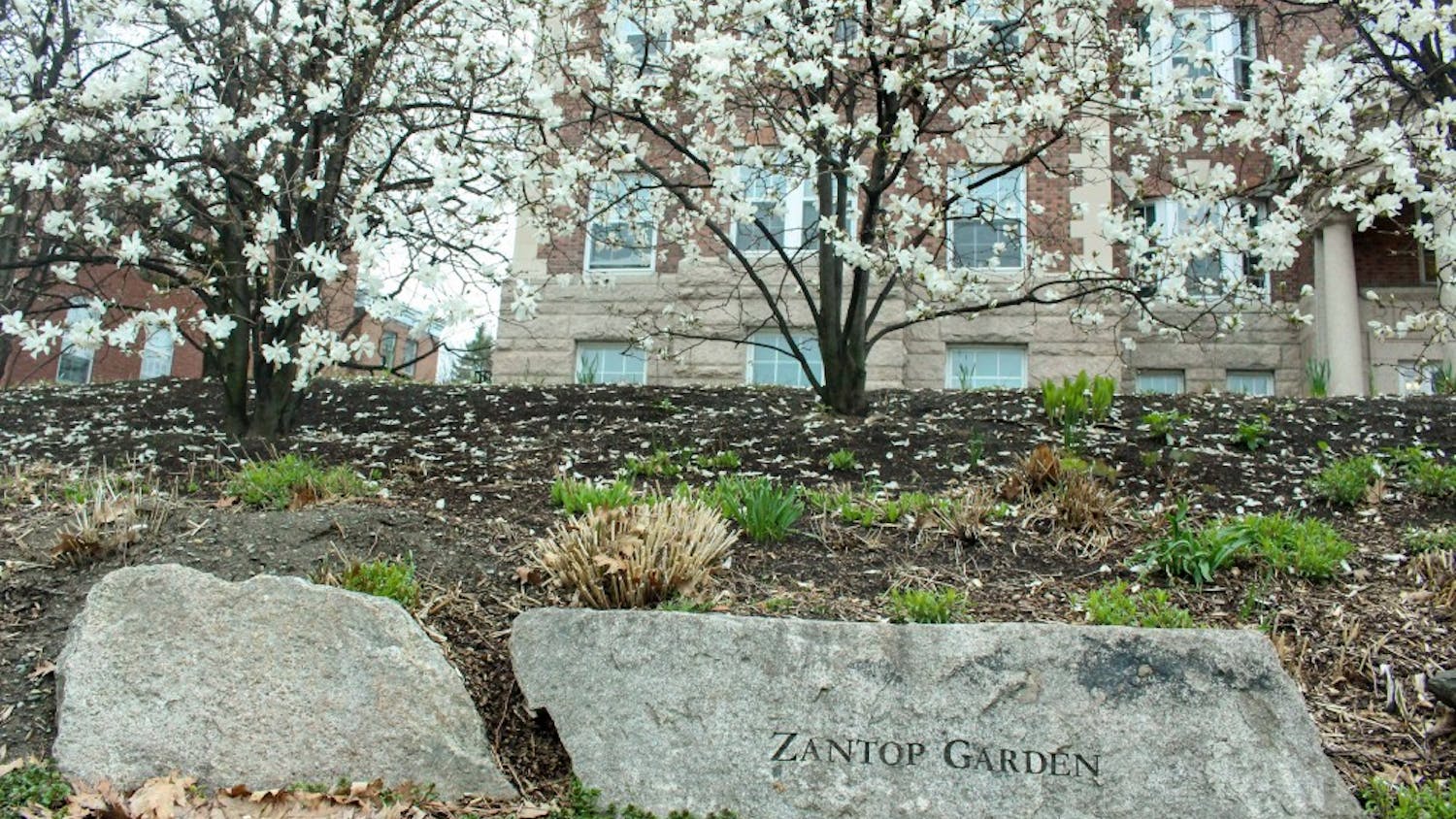It’s not unusual to find Dartmouth ranked highly on lists of the most beautiful college campuses, and not without good reason. From the fiery reds of fall to the delicate whites of winter to the vivid greens of spring and summer, it can sometimes feel like every inch of campus is manicured to perfection.
As students, we often take Dartmouth’s beauty for granted. Sure, we sometimes grumble about being woken up by noisy lawnmowers or catch a custodian mopping the floors during late-night study sessions, but for the most part we don’t think about how much work goes into keeping Dartmouth picture-perfect.
Rest assured, it’s a lot of work — just ask the people in charge.
Tim McNamara ’78 A&S ’12 is the associate director of Facilities Operation and Management. One of his main responsibilities is managing the grounds crew — the team of employees in charge of maintaining all of the College’s grounds. McNamara said that on a given day, there are about 36 grounds crew members working with a shop supervisor, whom he oversees.
While McNamara doesn’t do any hands-on work himself, instead serving his team by attending meetings and performing inspections, he is very familiar with the sheer amount of effort that goes into keeping Dartmouth’s grounds in ideal shape. He gave an extensive list of his team’s tasks, which include plowing snow off walkways and driveways, mowing grass, laying down mulch, maintaining trees and shrubbery, taking care of both natural and artificially-turfed athletic fields, raking leaves and collecting trash and recycling around campus.
Of course, the grounds crew’s work is dependent on the weather and season. During the spring and summer, McNamara said that every area of grass on campus is mowed at least once a week, with some areas even mowed twice a week.
“In May and June, turf is going really quickly, and we’ll need to touch it more frequently,” McNamara said. “And the athletic fields sometimes even more frequently than that. If they’re in play, they need to be perfect.”
On the other hand, in the winter, keeping Dartmouth’s sidewalks and roads takes up a significant amount of the grounds crew’s time and efforts. When asked how his team reacted to the unusually-late snowfalls last month, McNamara said that they were taken aback by just how long the winter dragged out.
Because so much of the shoveling takes place when it’s dark out, before most people wake up, he also emphasized just how tired a prolonged winter can make crew members feel.
“Our folks are out there nights, mornings and extremely early mornings,” McNamara said. “Typically, if we have a snowfall at night, they’ll be out there 3:30 to four o’clock in the morning, which is much earlier than their usual starting time.”
However, the grounds crew’s late nights and early mornings aren’t just limited for the winter. As an example, McNamara brought up the Homecoming bonfire. It takes days for the bonfire to be built, but after the night of Homecoming Friday, every remnant of the bonfire has been removed by the next morning. That, McNamara explained, is a result of how ground crew works all throughout the night.
It takes more than just one team to keep Dartmouth looking great, and members of grounds crew aren’t the only ones with late nights. Sandra Sowle, the custodial services manager, explained how maintaining the interior of buildings takes a great deal of hard work, too.
Sowle said that her primary responsibilities include many meetings, the focus of which ranging from managing buildings and staff to helping supervisors with the payroll to keep track of budgets — and much more.
Her entire team consists of 171 custodians and six supervisors. She described her relationships with those supervisors as one in which she helps them with their day-to-day activities and with keeping track of their individual employees. She also emphasized the importance of training them to support their employees as mentors and coaches, not just as bosses.
As the custodial services manager, Sowle ensures that the work schedule rotates properly, which is crucial considering just how much her team manages. They clean bathrooms and showers, sweep hallways, vacuum cafés and conference rooms, collect trash from central locations and disinfect surfaces daily, as well as cleaning offices weekly and tackling bigger projects on a quarterly basis.
Like the grounds crew, custodial services workers face a special set of challenges in the winter. Because melting snow makes carpets wet, they can’t just be vacuumed like they can in warmer weather. They also have to strip, wax and buff floors more often because of the white marks left by sand and salt.
“It can throw a monkey wrench in our day when it snows, because our custodians also have to shovel,” Sowle said. “That has to come first. Safety first.”
Certainly, custodial services has a lot on its plate — so it’s even more impressive that they are currently taking measures to improve their work. Sowle said that they’ve hired an external company to help assess the quality of their work and identify areas that can be strengthened.
For example, this company uses a one-to-five scale for the quality of cleaning, with one being the best and five being the worst, and Sowle said that Dartmouth’s rating was measured at a two. That score is already a good sign, but now custodial services is working to do even better.
Some of the changes that have already been made: for example, creating task sheets that list and organize what needs to be done each day, such as how to rotate cleaning and the introduction of an electronic building inspection program that can be done using workers’ phones.
Sowle said that even more changes are currently being discussed and finalized.
It’s evident by now that planning Dartmouth’s cleanliness is no small task, but what about the hands-on work? Chelsea Bergevin is the custodial squad leader for the carpet crew. Together with carpet crew members Kail Cadwell and Dave Fullerton, she described what her team’s shifts look like.
Carpet crew, self-nicknamed the “Heroes of the Night,” is on-call from 10:00 p.m. to 6:30 a.m. every day. Their normal responsibilities include cleaning the Child Care Center, Remsen and Vail Halls in the Geisel School of Medicine and the Corey Ford Rugby Clubhouse. They also serve as backup for any other work orders that might be placed during their shift.
Bergevin explained that during their shifts, they’re called in to take care of emergencies like cleaning up vomit and fixing clogged toilets. Once, she recalled, her team was called in to get rid of ants in a dorm room. Because they aren’t authorized to use bug spray or other exterminator tools, all they could do was vacuum the ants away.
Cadwell described how, because of the size of campus and the small size of carpet crew, sometimes answering an unexpected call while still fulfilling their usual responsibilities can be tricky to coordinate.
“Some days, if there’s an emergency work order to get done, we have to space off one of us to the daycare, and the other to go do something else,” Cadwell said. “Sometimes we have to split off.”
Bergevin explained that unfortunately, her team is often sent to take care of tasks that could easily be completed by students. She expressed her understanding of why students may not always want to take care of an issue themselves, admitting that she wouldn’t plunge a toilet herself if she didn’t have to, but she wishes that students were more aware of both the reason for their call and the timing.
For example, with the ants in a dorm room situation, she explained that after 10:00 p.m., nothing can be done by her team except use a vacuum cleaner. Had that student called earlier in the day or waited until the next morning, someone authorized to use the proper equipment could have taken care of things much more efficiently.
That said, she also doesn’t want students to avoid calling her when there is an issue that only they can resolve. Oftentimes, students will see something wrong but not speak up, and her team has no way of knowing about a problem if they aren’t told about it.
“If you do see something, call,” Bergevin said. “Say you’re in Baker, and you can’t use a sink … tell us.”
When asked about what students could do differently to make their jobs easier, both McNamara and Sowle said that they’d like students to be more careful when sorting trash and recycling. McNamara said that unfortunately, recycling bags sometimes have to be thrown into the trash because of contamination, and Sowle expressed a similar sentiment.
“It really affects the custodial staff a lot [when recycling is contaminated] because they want to see the right stuff go in the right places, and the numbers aren’t great,” Sowle said. “I think that’s just education and informing.” Fullerton said that he wishes that people take the extra second to make sure that trash makes it into trash cans instead of landing on the ground. Additionally, Bergevin would like to see students be more mindful of watching for cars and using crosswalks during the night, since her team often has a very short amount of time to travel around campus.
Perhaps more generally, one thing that we all can do as students is simply be more cognizant of the fact that the picture-perfect Dartmouth we get to enjoy doesn’t occur magically: it takes hundreds of people working day and night. The next time you see someone doing their part to keep Dartmouth looking beautiful, consider going out of your way to say “Hello” or “Thank you.” And, above all else, make sure you’re always doing your part, too.



